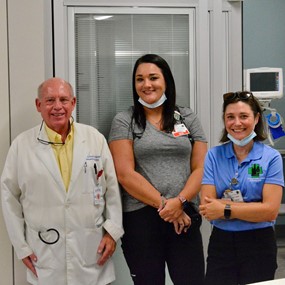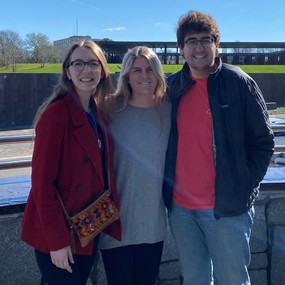Savage works tirelessly to preserve Washington County history
As the first county in Alabama, Washington County is a source of rich history for the state. So, it should be no surprise that people who live here work hard to preserve and celebrate that history.
Many are involved in groups such as the Washington County Museum Board, St. Stephens Museum Board, Prestwick Preservation Society, and the Washington County Historical Society.
But one woman, Micki Savage, belongs to all four of those groups, working tirelessly to promote and preserve local history.
Savage is a Leroy, Alabama, native whose involvement in history-related projects began several years ago when she joined the Washington County Museum Board. Savage then started her own research on African American history in the area.
Exhibits Spotlight Local History
Now, every February during Black History Month, she creates an exhibit for the Washington County Courthouse. She does all the research, and then her sister, Kathy Etheredge, helps create displays.
The exhibits are unique because Savage puts the spotlight on people from Washington County. “I pick someone local who has done something significant.”
Neighbors, friends, and family members can visit the courthouse and see their loved ones honored. Talking about the displays, Billy Donnell Johnson, who works in security for the courthouse, said, “They are lovely. She does a good job.”
Her displays focus on people who can be inspirations to others. She spotlighted Mallory Mitchell, 2009 winner of Washington County’s Junior Miss, now known as Distinguished Young Women. Savage identified Mitchell as the first local African American to win the award.
Savage also honored Prestwick High School by highlighting the school’s teachers. She explained that the school, which closed in 1969 after integration, was the first school in the area for black students from first grade to twelfth grade.
She paid homage to Julia Allen Wells, a former teacher at Prestwick High School, McIntosh High School and Frank Boykin Elementary. Wells was also instrumental in pushing for a library branch in McIntosh. She also recognized local police officer John Traylor for his role as one of the first African American officers in the area.
Her displays also celebrated graduates from Leroy and McIntosh High Schools who went on to become pro football and baseball players. The Leroy graduates are Kelvin Orlando Moore, Phillip S. Ervin, Sammie Coates Jr., and Emanuel King. These men also attended the same church, Goodstone A.M.E. Zion. The McIntosh graduate is Gregory DeWayne Wells, the son of Julia Allen Wells mentioned above.
Of course, some people not native to the county can be found in the displays, such as Madame C. J. Walker, the first black millionaire; President Obama; well-known African American women and other celebrities, athletes and humanitarians who are from Alabama but not necessarily Washington County.
Honoring Aunt Hagar
It wasn’t long before Savage shared her time and talents with St. Stephens Museum Board. Old St. Stephens is special because it is the place where Alabama began as it was the first capital of the Alabama Territory between 1817 and 1819.
However, the town was mysteriously wiped out, leaving behind several artifacts that attest to the former liveliness of the town. A legend claims that a travelling pastor cursed the town. After that, Old St. Stephens became a ghost town.
Today, Savage and many others work hard to preserve the history of Old St. Stephens. Though many speculate about what caused the demise of the once-booming town, one thing that can be confirmed is that a free woman of color, Mahala Martin, owned property here.
According to a biography provided by Savage, Martin, also known as Aunt Hagar, was born in 1791. She came from the Carolinas with Samuel Smith, a white man. No one knows the nature of their relationship, but Smith left Martin property in May of 1820.
With assistance from historian Tammy Chapman, Savage researched Martin. She then created an exhibit to honor her in the courthouse. After that, Wayne Blackwell, president of the Washington County Museum Board and member of the St. Stephens Museum Board, asked her to do more research on Martin so that she could qualify for induction into the Hall of Fame. On May 3, 2019, Savage accepted the plaque for the Hall of Fame on behalf of Martin.
Her work didn’t stop there. Savage created yet another display to share Martin’s story in the Washington County Public Library. For the library display, she included decorations from the time period, a photo of Old St. Stephens, and information about the Tignon Law that restricted women of African descent from showing their hair in public.
The exhibit also includes a news article about Martin that discusses the court case in which she had to fight for her right to have the property willed to her by Smith as well as a doll, property of St. Stephens Museum, dressed in the attire that reflects the time period of Martin’s life in Old St. Stephens.
Through research about Martin, Savage connected with author and professor Ralph Eubanks, a native of Washington County. In the past, Eubanks met with Savage’s father, Shed Gregg. He was getting information about Eubanks’ grandfather, who was friends with Gregg, for his book, “The House at the End of the Road.”
While searching for that information, Eubanks journeyed to St. Stephens where it was discovered that Martin and Eubanks’ grandmother may be distant relatives. Savage, who had not yet met Eubanks, did not learn this information until she read a signed copy of the book that Eubanks gifted to her father.
Years passed, and as Savage was creating her displays on Martin, she decided to reach out to Eubanks to invite him to be a guest speaker for St. Stephens Museum’s Lunch and Learn. He was given the opportunity to talk about his book, what he learned from Gregg, and information about Martin.
Preserving Prestwick Memories
The next project Savage took on is her work with the Prestwick Preservation Society.
As a student, Savage attended Prestwick High School. Though she lived in Leroy, her house was near the Prestwick community. Savage said the community once had a saw mill, store, train station, post office and churches.
However, people started leaving Prestwick. Years later, Savage began going back through the history of the town, trying to gain more insight to the area and what exactly happened to it. A vested interest into the area took her from doing research to leading a team to create a passive historical park.
The project started when Lauretta Cooper, director of the Chanticleer Learning Center in Lee County, contacted her for information on Prestwick High School. Cooper’s class had received a grant for the Alabama Bicentennial to spotlight a historical area. Savage said Cooper used to live in Prestwick, which led to her class focusing their attention on Washington County.
Cooper had learned of the display that Savage had already done about Prestwick’s teachers in the courthouse and got in touch with her. “She was telling me they wanted to put a marker where the school was, but it was no longer available because someone had bought the land,” said Savage.
Oddly enough, Savage had access to the land right across from where the school had been. She contacted the owner, Professor Alvin Williams, and he leased the land to her under the stipulation that it could only be in her name.
By that time, Savage, as president, began hand-picking her team for the Prestwick Preservation Society. She was joined by the Rev. Richmond Chaney, vice president; Dr. Joanne P. Barnes, treasurer; and Kathy Etheredge, secretary.
They were joined by Robert Chaney, Harold Daffin, Connor Etheredge, Kenneth Etheredge, Bobby Farish, Joyce Hogi, Warren Howell, Mattie Bea Jackson, the Rev. Ivory James, Billy D. Johnson, Sr., Jackie Roy Johnson, Jasper McDonald, Linda McDonald, Anthony Richardson, Jimmie Richardson, Carlos Savage, Gregg Savage and others, to get the Prestwick Preservation Society in full swing.
In just six months, the team cleared off the lot and turned it into a passive park with benches, a sidewalk and the marker. The park was dedicated May 11, 2019, with Emory Mosley, historian and president of the Washington County Historical Society, as guest speaker.
After Mosley, Joyce Hogi presented guests with valuable history about the post office and high school now highlighted on Prestwick markers. There were also joined by the Chanticleer Learning Center class because of their work on the grant that provided for the marker.
The transformation of the park reflects the Prestwick Preservation Society’s mission statement, which is “to uplift the community through historical research, education and commemorative events; charting the road ahead by preserving the path before.”
The work with the park pleased many in Washington County. Friend and District Judge Jerry L. Turner, called Savage “the main shaker and mover in that project.” He also complimented her for the “historical research she has done and all the time and effort she has put into it.”
Savage’s journey to preserve African American history does not stop here. Even as a child, she was always interested in the topic. So, growing up in school with history lessons and books that lacked adequate information unsettled her. That discomfort led Savage to begin conducting her own research. Her goal has been to spread the information she has learned to help educate the public about valuable people and places in history, and she has done that every step of the way.
Tags: Chatom



